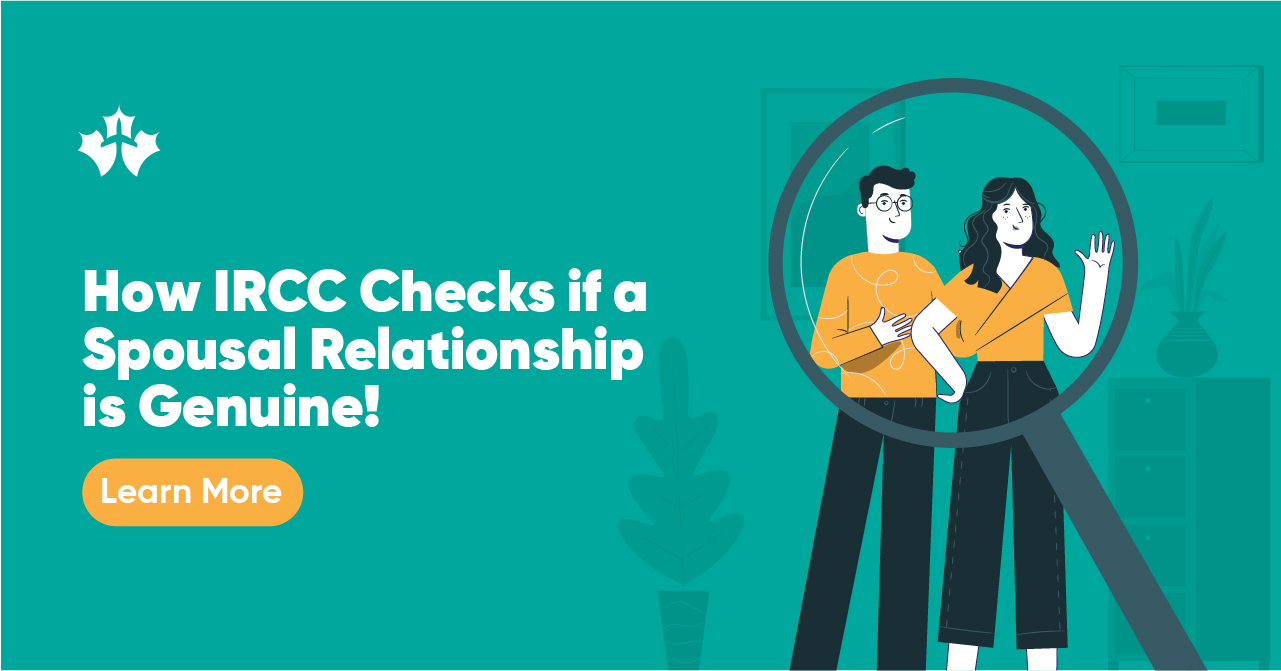Our Blogs
How IRCC Checks if a Spousal Relationship is Genuine

If you are a Canadian citizen or permanent resident who wants to sponsor your spouse or partner for Canadian immigration, you will need to prove to Immigration, Refugees and Citizenship Canada (IRCC) that your relationship is genuine. IRCC will look at several factors to determine whether the relationship is real.
Here are some specific examples of how IRCC may assess the genuineness of a spousal relationship:
- The length of the relationship: IRCC will look at how long the couple has been together and how well they know each other.
- The frequency of contact: IRCC will look at how often the couple communicates with each other and how often they see each other in person.
- The amount of time spent together: IRCC will look at how much time the couple has spent together in the past and how much time they plan to spend together in the future.
- The nature of the relationship: IRCC will look at whether the couple is married, common-law partners, or dating.
- Shared goals and plans: IRCC will look at whether the couple has shared goals and plans, such as buying a house or starting a family.
Demonstrating Authenticity of a Relationship
The process of substantiating the authenticity of a relationship involves couples, including those in same-sex partnerships, providing evidence. The nature of the documentation required varies based on whether the couple is legally married or in a common-law relationship in Canada.
For Married Couples
Couples who are legally married need to furnish a range of official documents, including:
- A completed Relationship Information and Sponsorship Evaluation questionnaire (IMM 5532), which is included in the application package.
- A valid marriage certificate.
- Evidence of marriage registration with a government authority at the local, provincial, state, or country level.
- Documentation indicating divorce if either the applicant or spouse was previously married.
- If the couple has children in common, long-form birth certificates or adoption records listing both parents’ names.
- Wedding photographs and invitations.
Addressing Same-Sex Couples
If a same-sex marriage is not legally recognized in the foreign national’s country, the couple can opt to apply as a common-law relationship. In cases where the couple has not been able to cohabit due to visa restrictions, they may apply as conjugal partners.
For Common-Law Relationships
In Canada, a common-law relationship is defined as an unmarried couple living together in a conjugal partnership for at least one year. The documentation required is akin to that for married couples, excluding wedding photos and invitations. Additionally, the following is necessary:
- Documented evidence of financial support between the principal applicant and sponsor, along with shared expenses.
- Other forms of proof indicating recognition of the relationship by friends or family, such as letters or social medical information demonstrating a public connection.
Further, both married and common-law couples are expected to submit items from at least two of the following categories:
- Evidence of joint ownership of residential property.
- A rental agreement indicating both the sponsor and principal applicant as occupants.
- Proof of joint utility accounts (e.g., electricity, gas, telephone, internet), shared credit card or bank accounts.
- Vehicle insurance documents confirming both parties as residents of the same address.
- Copies of government-issued documents displaying the same address.
- Other documents issued to both parties with matching addresses (e.g., cell phone bills, pay stubs, tax forms, bank or credit card statements, insurance policies).
- In cases where a couple cannot provide at least two of these documents, a thorough written explanation is required.
Substantiating Cohabitation
Couples can establish their cohabitation as conjugal partners in Canada by submitting evidence such as:
- Shared bank accounts or credit cards.
- Joint ownership or leasing of residential property.
- Agreements for joint residence.
- Documentation related to shared utility accounts (electricity, gas, telephone).
- Proof of jointly managed household expenditures.
- Evidence of joint purchases, especially for household items.
- Correspondence addressed to both parties at the same address.
- Important documents of both parties displaying the same address, like identification documents, driver’s licenses, insurance policies.
- Shared responsibilities for household management and chores.
- Records of telephone communications.
If the couple is not residing together in Canada, they can demonstrate prior cohabitation by presenting:
- Proof of communication, such as letters, printed text messages, emails, or social media interactions.
- Evidence of visits by the Canadian citizen or permanent resident partner, such as flight tickets, boarding passes, or passport copies with entry stamps. If visits have not occurred, the sponsored individual must provide an explanation in the IMM 5532 questionnaire (Part C, question 4)
At SPS Canada Immigration, we stand by your side to ensure that love and commitment are recognized and celebrated. As a trusted partner, we help you navigate the journey of bringing your spouse or partner to Canada with confidence. With a deep understanding of the importance of genuine relationships, we provide expert guidance and support throughout the process, ensuring your bond remains at the heart of your immigration story.
Comments
Our Clients
We're Trusted Globally
We are a regulated immigration practicing firm, providing advice and
solutions on matters related to Canadian immigration.














